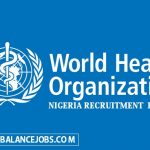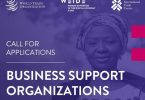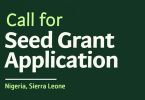
World Health Organization (WHO)
Outbreak Response Officer (SIAs) – NOC at World Health Organization (WHO). Please make sure you read the job requirements before applying for this position.
World Health Organization (WHO) is the directing and coordinating authority for health within the United Nations system. It is responsible for providing leadership on global health matters, shaping the health research agenda, setting norms and standards, articulating evidence-based policy options, providing technical support to countries and monitoring and assessing health trends.
We are recruiting to fill the position of:
Job Title: Outbreak Response Officer (SIAs) – NOC
Reference ID: 2106957
Location: Abuja
Schedule: Full-time
Grade: No grade
Contractual Arrangement: Special Services Agreement (SSA)
Contract Duration (Years, Months, Days): 6 Months
Organization: AF_NGA Nigeria
Tasks
Under the PEP IMS, the incumbent is expected to support State Coordinators in ensuring that State and LGA Authorities, partners and other appropriate stakeholders conduct the following specific tasks:
SIA Planning, Implementation and Monitoring:
- Preparation of high-quality pre-implementation (micro-planning, training, logistics) plans
- Implementation of micro-planning with attention to NEOC recommendations on m/planning.
- Implementation of key recommendations and agreed action points from the NEOC and other Abuja meetings aimed at raising the quality of PEP activities.
- Implementation of high-quality training of all cadres involved in IPDs including independent monitors
- Monitoring of SIA implementation in the highest risk areas and timely institution of corrective action.
- Cluster consultants/LGAF and FVs Participate in daily SIA review meetings and ensure follow up on action points.
- Participate in the Supervision of Independent monitors and ensure findings used for immediate action including re-do
- Reviewing of each SIA round, best practices, challenges, appropriate action and feed into planning for subsequent round i.e. evidence-based planning, systematic feedback to government authorities.
- Support the National EOC in developing solution based innovative ways of improving the quality of SIAs.
AFP Surveillance Planning, Implementation and Monitoring:
- To provide technical guidance to ensure high quality planned SIAs and Mop Up activities within the context of Covid 19 and continuity of essential care.
- To provide technical guidance for prompt and timely response to the reported outbreaks of any non-Sabin poliovirus (including nOPV2 deployment, high quality VDPV2 Outbreak investigation, risk assessment and response activities / Mop Up activities) within the context of continuity of essential care
- To conduct regular mapping of security challenged areas, special groups (Internally Displaced Persons (IDPs), nomads, fishermen) in borders and hard to reach areas; and develop strategies to increase access to PEI/ health interventions (Special intervention); guide appropriate documentation towards certification at all levels
- To support national/ State authorities in facilitating implementation of Non-Polio Supplemental activities-NPSIAs (including accelerated disease control (ADC); Measles, Yellow fever, MNTE as well as Covax).
- To support National/ State authorities to achieve and/or maintain certification standard performance for recommended Integrated Disease Surveillance and Response (IDSR) activities, ADC and AFP surveillance.
- To contribute to achievement of key management performance indicators
- Enabling and empowering the workforce to do and be their best and to adopt a culture of continuous learning
- Coordinate with partners and other stakeholders (UN, international NGOs, Academic and research institutions etc) to make sure they are incorporated the response operations
- Coordinate partner’s response efforts and incorporation of partner’s activities in the national response plan
- Ensure to keep relevant partners and donors informed and updated about the situation in the field.
Routine Immunization Planning and Monitoring:
- Finalization of REW micro-plans with priority given to high risk LGAs and underserved populations.
- Implementation and monitoring the 1,2,3 strategy, with priority to high risk LGAs and underserved populations.
- Implementation of monthly RI review meetings including documentation & follow up of identified priority action points.
Cross Cutting Tasks:
- Support the PEP Cluster Lead in conducting Quarterly performance appraisal of CCs, LGAFs and FVs.
- Utilization of programme funds including but not limited to intensified funds, Logistics and social mobilization funds
- Finalization of Evidence based State PEI/EPI Emergency plans.
- Conduct of quarterly capacity building and information sharing with cluster consultants, LGAFs, FVs and relevant health workers from government authorities.
- Conduct of a systematic Advocacy to promote compliance with Abuja commitments (and BMGF Leadership Challenge)
- Strengthening of partnership with Government officials, Traditional Leaders, Civil Society, Religious Leaders, Women’s Groups, Professional Associations, Civil Society…etc
- Provide any other support as requested by EPI Team leader.
Key Performance Indicators (KPI)
The following Key performance indicators will be monitored to assess the contribution of the staff in PEP IMS towards the overall assignment objective.
SIA Planning, Implementation and Monitoring:
- Assigned HR States (and priority LGAs) Develop High risk LGAs with comprehensive holistic pre-implementation assessment reports prior to each SIAs/OBR in the context of COVID-19.
- Assigned HR states (& priority LGAs) with quality evidence based 6 months operational plans.
- Assigned HR states (and priority LGAs) with evidence of improved vaccination team performance (selection, training, supervision, evening review meetings)
- Assigned HR States (and priority LGAs) with evidence of improved independent monitoring and use of data for remedial action
- Reports of investigation conducted in poor performing ward (ward with > 25% missed children) and HR wards (WPV or c-VDPV).
AFP Surveillance Planning, Implementation and Monitoring:
- Assigned HR States with high quality AFP Surveillance work-plans.
- Quarterly surveillance supervision (active surveillance) reports and follow up on action points.
- Assigned HR States (with focus on poor performers) with evidence of implementation of RSA recommendations
- Quarterly evidence of quality, action oriented monthly surveillance review meetings at state level.
Routine Immunization Planning and Monitoring:
- At least 1 HR State with updated REW micro-plans
- At least 1 high risk state with evidence of implementation of 1, 2, 3 strategy.
- Monthly evidence of quality, action oriented monthly RI review meetings at state level.
Cross Cutting Tasks:
- Evidence based updated 2025 State Emergency PEI/EPI Plan forwarded to national by 31st January 2025
- Bi-annual plan to build capacity of field workers developed by State Coordinator(s) and their Cluster consultants.
- State Advocacy plan to promote Abuja commitments and BMGF Leadership challenge
- Evidence of efforts to promote engagement of partners including CBOs, Women groups, etc
- Detailed mission report reflecting on state-wide activities.
Reporting Requirements
- The WHO technical officer will report through the Supervisor to the PEP Cluster Lead/GPEI Coordinator
- Overall Technical Guidance for the programme will be provided in line with national guidelines by the PEP Cluster Lead.
- Overall policy and managerial support and guidance will be provided by the WHO Representative in Nigeria.
Required Qualifications
Education:
- Essential: First level University Degree in Medicine and / or Public Health Planning and Administration, complemented by training in Public Health / Epidemiology / Health Science.
- Desirable: Master’s Degree in Public Health or equivalent. Training in epidemiology and/or outbreak investigation will be asset.
Experience:
- Essential: At least 7 years of experience required in public health surveillance with emphasis on emergency response relief and/or the management of epidemic-prone diseases.
- Desirable: Experience in the areas of outbreak investigation and response for emerging and re-emerging infectious diseases, particularly in developing countries.
Skills:
- Demonstrated knowledge, competency and professional skills on the public health aspects of infectious disease control,
- Epidemic and pandemic preparedness and response with particular attention to application of an all-hazard approach in the context of the International Health Regulations (2016) and the use of event based and indicator-based surveillance, as well as descriptive epidemiology and principles of public health in communicable disease surveillance and response;
- Managerial skills for the development, implementation, monitoring and analysis of public health programmes for infectious diseases within a highly demanding work environments.
- Sound knowledge and skills in database management and statistical analysis, secondary data review, survey designing and implementation, monitoring and evaluation systems design or use, and public health information management.
- Strong professional oral and writing skills including the development of reports, oral presentations and technical guidance and advocacy documents.
WHO Competencies
- Teamwork
- Respecting and promoting individual and cultural differences
- Communication
- Building and promoting partnerships across the organization and beyond
- Knowing and managing yourself.
- Creating an empowering and motivating environment.
Use of Language Skills:
- Essential: Expert knowledge of English and local language.
Application Closing Date
11:59 PM: 21st December, 2021.
Method of Application
Interested and qualified candidates should:
Click here to apply online
Important Notice: Please note that the deadline for receipt of applications indicated above reflects your personal device’s system settings.
To apply for this job please visit careers.who.int.






